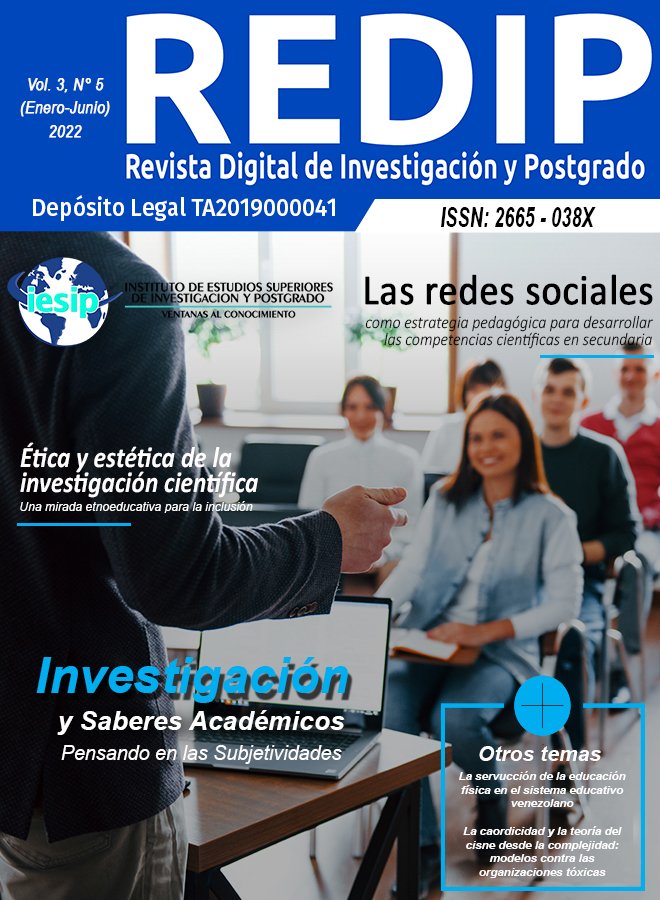Popular participation and open government in venezuelain times of the Covid-19 pandemic
DOI:
https://doi.org/10.59654/hh6sys03Keywords:
Popular participation, community participation, Open Government and Covis-19 pandemic.Abstract
The main objective of this article is to theoretically analyze participation as well as its applicability
and validity in times of the Covid-19 pandemic, emphasizing citizen participation and Open Government. In this sense, the conceptual elements that supported the development of this article were identified. From the promulgation of the Constitution of the Bolivarian Republic of Venezuela (1999), participation acquired a new meaning, we left behind the model of participatory democracy as a mere process of representativeness to assume participatory and protagonist democracy, in which the citizen and its new associative forms are supported by the constitutional text, givingstrength to popular power as a form of organization and relationship of the communities with the national, regional and local public power. The Covid-19 pandemic put both public organizations and the organized community to the test, and fundamentally popular power to help ensure that the pandemic did not cause so much havoc in the country; here social networks played a very important role
Downloads
References
Águila, R. (2006). La Participación como generadora de Educación Cívica y gobernabilidad. Revista Iberoamericana de Educación, No. 12, septiembre-diciembre, 1996. http://www.rieoei.org/oeivirt/rie12a02.htm.
Álvarez, E. L. (coordinadora) (1997), Participación y democracia en la ciudad de México. La Jornada Ediciones/Centro de Investigaciones Interdisciplinarias en Ciencias y Humanidades. Universidad Nacional Autónoma de México.
Bárcena, A. (2020). Acción Local para Compromisos Globales sobre la respuesta y recuperación inclusiva, resiliente y verde a la crisis del COVID-19 a nivel local. Secretaria Ejecutiva de la Comisión Económica para América Latina y el Caribe (Cepal). https://www.cepal.org/es/noticias/alicia-barcena-la-pandemia-covid-19-es-un-llamado-repensar-desarrollo-urbano-avanzar-un.
Constitución de la República Bolivariana de Venezuela (1999). Gaceta Oficial No 5.453. Extraordinaria de fecha 24-02-2000.
Coraggio, J. L. (2004). De la emergencia a la estrategia. Más allá del “alivio a la pobreza. Espacio Editorial.
Cunill, N. (1991). La participación Ciudadana. Centro Latinoamericano de Administración para el Desarrollo.
El Troudi, H., Harnecker, M. y Bonilla, M. L. (2005). Herramientas para la Participación. Venezuela: edición financiada por la Corporación Venezolana de Guayana (CVG).
El Troudi, H., Harnecker, M. y Bonilla, L. (2005). Herramientas para la Participación. Caracas - Venezuela.
Gallicchio, E. (2002). Conferencia electrónica - Empoderamiento y Desarrollo Local. http://www.desarrollolocal.org.
Hernández, A. (2002). Participación y desarrollo Sostenible. Universidad Politécnica de Madrid. España.
Hernández, J. (2013). Perspectiva conceptual normativa de la participación ciudadana y democracia en Venezuela. Telos. Revista de Estudios Interdisciplinarios en Ciencias Sociales. Universidad Rafael Belloso Chacín. http://www.redalyc.org/articulo.oa?id=99326637005.
Hoyos, G. (2003). Ética y Educación para una ciudadanía democrática. En varios autores. Camino hacia nuevas ciudadanías. Bogotá, D.C. Instituto pensar, Universidad Javeriana y Departamento Administrativo de Bienestar Social.
Lavell, A. et al (2020). Herramientas para interpretar la pandemia COVID-19: desastre, políticas públicas y gestión del riesgo. Revista Red de Estudios Sociales en Prevención de Desastres en América Latina, páginas 1-15. https://www.gub.uy/sistema-nacional-emergencias/comunicacion/publicaciones/construccion-social-pandemia-covid-19-desastre-acumulacion-riesgos
Published
Issue
Section
License
Copyright (c) 2021 Revista Digital de Investigación y Postgrado

This work is licensed under a Creative Commons Attribution-NonCommercial-ShareAlike 4.0 International License.
Esta licencia permite a los reutilizadores distribuir, remezclar, adaptar y desarrollar el material en cualquier medio o formato únicamente con fines no comerciales, y solo siempre que se atribuya al creador. Si remezclas, adaptas o construyes sobre el material, debes licenciar el material modificado bajo términos idénticos. CC BY-NC-SA incluye los siguientes elementos:
![]() POR: se debe dar crédito al creador.
POR: se debe dar crédito al creador.![]() NC: Sólo se permiten usos no comerciales de la obra.
NC: Sólo se permiten usos no comerciales de la obra.![]() SA: Las adaptaciones deben compartirse en los mismos términos.
SA: Las adaptaciones deben compartirse en los mismos términos.











